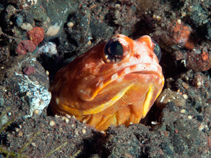| Family: |
Opistognathidae (Jawfishes) |
| Max. size: |
9.62 cm SL (male/unsexed) |
| Environment: |
pelagic-neritic; marine; depth range 0 - 37 m |
| Distribution: |
Indo-West Pacific: from the eastern Indian Ocean (Maldive Islands and Sri Lanka)
and throughout most of the central western Pacific, including the Ruykyu Islands and Palau. |
| Diagnosis: |
Dorsal spines (total): 11-11; Dorsal soft rays (total): 14-16; Anal spines: 3-3; Anal soft rays: 14-16; Vertebrae: 28-30. This species is distinguished by the following characters: elongate supramaxilla and posterior end of maxilla produced as a thin flexible lamina, varying from moderate to well-developed; usually a single black stripe (well-developed in fish with elongate jaws but only slightly in those with relatively short jaws) at the inner lining of upper jaw and adjacent membranes; lateral-line ends below verticals between segmented dorsal-fin rays 3-6 (typically fourth or fifth); body with about 68-83 oblique scale rows; caudal vertebrae 19-20 (rarely 20), except only 18 in fish from northern Palawan. There are several color morphs that exist (geographic variations) (Ref. 81517). |
| Biology: |
Found in sand/rubble bottoms in 0-37 m (Ref 90102). |
| IUCN Red List Status: |
Least Concern (LC); Date assessed: 05 March 2015 Ref. (130435)
|
| Threat to humans: |
harmless |
Source and more info: www.fishbase.org. For personal, classroom, and other internal use only. Not for publication.
